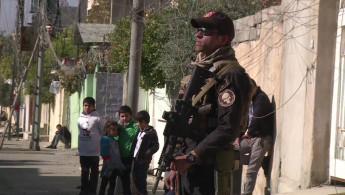NGO calls for 'safe exits' for Mosul's trapped ciivlians
The International Rescue Committee also predicted that the fighting to retake the IS's northern stronghold would last until the spring of 2017 and worried that the trapped population would run out of supplies or take huge risks to flee.
"Even with the best efforts of the Iraqi forces to keep residents out of harm's way, the fighting is just too intense," IRC's Iraq director Alex Milutinovic said.
Around 70,000 people have fled their homes in the region since the start on October 17 of a huge offensive against Mosul, only about 30,000 of them from inside the city itself.
The number of displaced is significantly lower than what the UN and other aid organisations had forecast before the operation began.
IRC said that was due at least in part to the intensity of the fighting making it too dangerous for civilians to flee and reach the safety of the camps being set up around Mosul.
"Which is why Iraqi forces need to do everything they can to ensure there are safe routes of escape," Milutinovic said.
"The fighting in Mosul also makes it very difficult to deliver aid and with supplies already running low there are also fears that families will soon be without any food or medicine," he said.
On Thursday, a commander with Iraq's Counter-Terrorism Service [CTS] told The New Arab that his forces captured the neighbourhood of al-Khadra in Mosul.
CTS forces also pushed out IS militants from the neighbourhoods of al-Zuhour, Aden, al-Tahrir and al-Maharibin, joint operations army commander Taleb Shaghati said at a news conference in Mosul.
IS militants now left in the city - already willing to blow themselves up in their hundreds to slow the Iraqi advance - are now almost certainly gearing up for a fight to the death.
"They cannot flee. They have two choices - give up or die," Maan al-Saadi, a commander with the CTS said.
Around 40 percent of eastern Mosul had now been retaken, Saadi added.
But civilians attempting to cross the battle lines to flee the fighting are paying a heavy price and those who have decided to stay at home are routinely caught in the crossfire.
Mosul, which fell to IS in the summer of 2014, is still home to more than 1 million people.
Agencies contributed to this report.





 Follow the Middle East's top stories in English at The New Arab on Google News
Follow the Middle East's top stories in English at The New Arab on Google News


